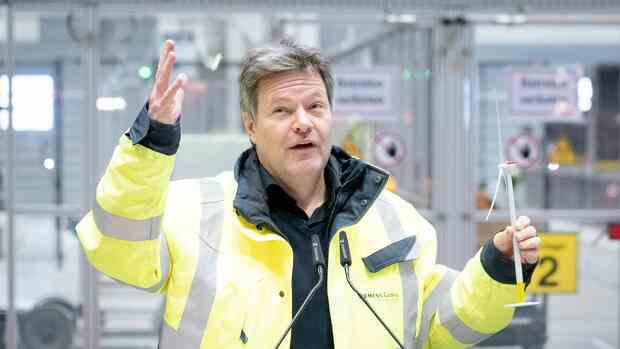The Federal Minister of Economics has been fighting with the coalition partners for months over his energy efficiency law.
(Photo: IMAGO/Chris Emil Janssen)
Berlin Five months, a week and two days and still no agreement. This is the current record of the Energy Efficiency Act planned by Federal Economics Minister Robert Habeck (Greens). With the law, he wants to reduce Germany’s energy consumption to protect the climate, set targets for this and oblige companies to take cost-cutting measures.
Habeck submitted a first draft in October. But for the SPD and especially the FDP, the plans go too far. But there will be no further months of waiting. The traffic light has agreed in the coalition committee: The energy efficiency law should come soon. Exactly how is the big question now.
Business has high hopes that Liberals and Social Democrats will bring about significant changes to the law. Because industry representatives have calculated that Habeck’s plans could be accompanied by great burdens for the entire economy.
Her focus is primarily on the central target in Habeck’s draft law: by 2030, 24 percent less final energy should be consumed than in 2008. Final energy is the energy that is ultimately used by households and companies.
There are two ways to reduce energy consumption. Through greater efficiency, above all through new machines that use less electricity or gas. Or directly by shutting down plants and restricting production.
Less energy consumption, less economic output?
Everyone agrees: the focus should be on the first path. Shutting down the economy to save energy costs wealth. But is it even possible to achieve such a large increase in efficiency to achieve the goals by doing this alone?
>> Read here: Disagreement over the second part of the chancellor’s word of power – the federal government postpones the energy law
The German Chamber of Industry and Commerce (DIHK) analyzed this. Result: Germany would have to increase its energy efficiency extremely in order to achieve the legal target without having to shrink economic output.
The DIHK investigation is available to the Handelsblatt. Several independent economists have checked the calculations and consider the results to be plausible. The DIHK differentiates between several cases:
- Between 2008 and 2021, energy efficiency in Germany increased by 1.4 percent annually. If this remains the case until 2030, a lot of energy would have to be dispensed with directly. This would result in German gross domestic product (GDP) shrinking by almost nine percent by 2030.
- As early as 2010, the then federal government had set itself the goal of increasing efficiency to 2.1 percent per year, which has not been achieved to date. Even if that were to work now, it would not be enough to achieve the savings target. More energy would still have to be saved on the direct path. So much that GDP would shrink by almost seven percent by 2030.
- The high energy prices in the wake of the Ukraine war and the rising CO2 price could make it possible for the German economy to invest significantly more in energy efficiency. A rate of 3.2 percent would make it possible for GDP not to shrink to meet the target under the law. Even then, however, energy would still have to be saved directly and GDP would at least not grow as quickly.
The calculation has one limitation: It assumes that an equal amount of energy is saved in all areas. However, if energy consumption is reduced, especially in private households, through better insulation and more efficient heating, fewer companies would have to cut back on their production and the GDP loss would be smaller.
However, the potential, broken down by individual areas, is not so easy to determine. And it is clear that households alone cannot bear all the energy savings.
FDP sees the coalition decision as “the leanest possible law”
This is also known in the Federal Ministry of Economics. There, reference is made to information that energy efficiency increased by 6.9 percent in 2022. However, this was due to high energy prices as a result of Russia’s war of aggression against Ukraine, a spokeswoman admits.
But in the ministry they have hope that this is a trend reversal: “The figures for 2022 show that significant improvements in efficiency and economic growth can be achieved at the same time as reducing energy consumption.”
>> Read here: Three scenarios for the future of German industry
But that the noble savings target of 24 percent by 2030 will actually end up in law has become less likely with the coalition resolutions on Tuesday. It just says that the law should take an EU directive into account.
That guideline provides for a savings target of just 22 percent. And above all: the goal applies to the entire EU. Strict savings targets cannot necessarily be derived from this. The FDP sees the coalition decision as merely a “one-to-one implementation” of the EU directive. Group Vice President Lukas Köhler wants to pass an “energy efficiency law that is as lean as possible” in order to avoid “unnecessary burdens on the German economy”.
More: Hope for US billions in funding for German car manufacturers

